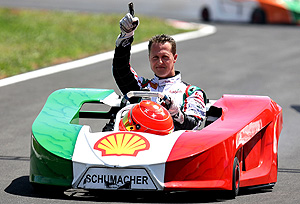
It is fitting that in recent days that I have started reading former Formula One commentator James Allen’s revealing book, “Michael Schumacher: The Edge of Greatness”.
This weekend’s race at Belgium’s iconic Spa-Francorchamps, situated within the Ardennes forest, marks the twentieth anniversary of the great man’s arrival on the scene, the German having debuted at the same track in the last weekend of August of 1991 for Jordan.
The rest is history, the then 22 year old qualifying seventh before retiring on the opening lap with clutch failure. By the next race at Monza, he was sitting in a Benetton, and three years later, he was world champion.
Having read the early stages of Allen’s book, I have gained a deeper appreciation of the mountains Schumacher had to climb to reach the pinnacle of motorsport, unlike a Lewis Hamilton or a Sebastian Vettel, backed by their respective current teams from a formative age.
His juxtaposition of arrogance and modesty, his maturity, but most of all, his unbridled passion for racing, is striking, something you’d struggle to find in any other driver in history, even Ayrton Senna.
Michael Schumacher isn’t number one in the eyes of everybody, his countless achievements being clouded by the few and far between instances of questionable tactics, but nobody can take away from the fact that he is the most successful driver, in every significant department, of all time.
Barcelona 1994, having won the first four races of a season remembered only for the tragic death of Senna, the man Schumacher was destined to rival, his Benetton clutch failed, and the German nursed the car home exclusively in fifth gear for nearly half a race to second position.
Barcelona 1996, pouring rain, in his first season at Ferrari, the car an absolute dog, coming from way back in the field after a poor start, Schumacher defied all odds to win by forty-five seconds.
Hungary 1998, again with an inferior Ferrari chassis at his disposal, as opposed to the supreme Adrian Newey-designed McLarens of Mika Hakkinen and David Coulthard, strategy mastermind Ross Brawn switched Schumacher to a three-stop strategy, requiring the German to gain twenty-five seconds in nineteen laps to assume the lead.
Schumacher promptly put in nineteen qualifying laps, emerged from the pits with the lead, and never looked back.
These kind of drives never escaped Schumacher, even up to his first retirement.
At the final round of the 2006 season at Brazil, having seen the chance of an eighth world title evaporate along with his engine at Suzuka, starting from tenth on the grid, Schumacher climbed to sixth, before a clash with Giancarlo Fisichella punctured his left rear tyre, and he fell to the very back of the field.
Nice knowing you Michael.
Not on his watch.
What happened next wasn’t short of mesmerising, as Schumacher methodically dispatched each car, one by one, and in a move laden with irony, overtook the man who would replace him at Ferrari, Kimi Raikkonen, for fourth place with three laps remaining.
Even his most questionable act, at Monaco in 2006, “locking up” at Rascasse in a move deemed to have been deliberate to hamper others’ final run in qualifying, ended in some sort of greatness.
Schumacher was sent to the back of the grid.
He finished fifth.
Who does that? Who in the world makes up seventeen positions, at Monte Carlo of all places? Only Michael Schumacher.
Forget Adelaide 1994, Jerez 1997 or any other of Schumacher’s ‘interesting’ tactics, they’re all part of the legend, they’re part of what makes Michael Schumacher Michael Schumacher. Formula One has benefitted as a result of his demeanour.
Hopefully, he can wind the clock back with another vintage performance at the scene of so many of his successes – six wins, the infamous crash with David Coulthard, winning the 2004 title with five races to spare, this weekend, but most importantly, to remind everybody that he entered the sport twenty years ago, and he’s still around today.
No mean feat.





























































































